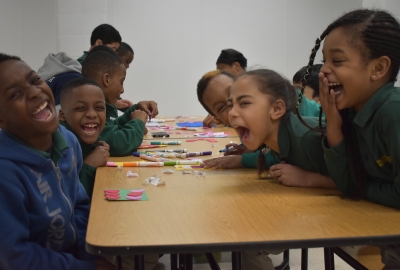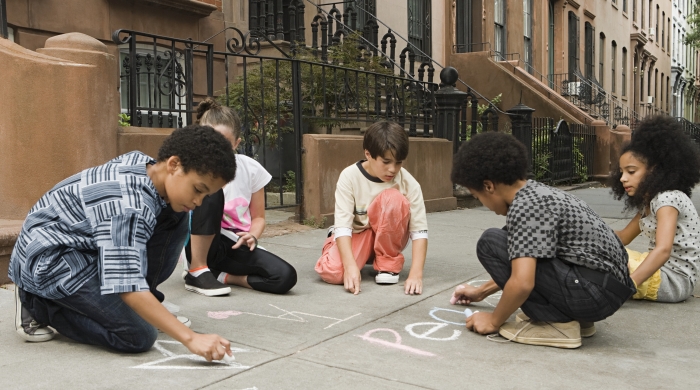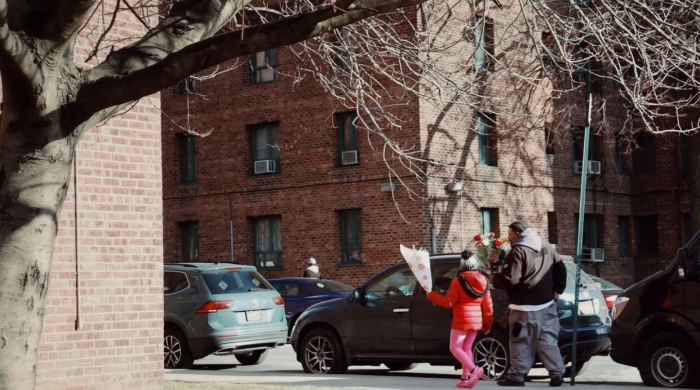
Since 2014, researchers at the Institute of Human Development and Social Change and a cross-unit team at Good Shepherd Services (GSS) have partnered to create Advancing Collaborative Research in Out-of-School Settings (ACROSS). Their successful partnership has led to research publications and practice briefs highlighting a framework for high quality afterschool programs that emphasize a structured, responsive, and engaging environment for afterschool staff and students. Together, they work toward the common goal of advancing opportunities and improving outcomes of the children and youth who attend afterschool programs.
On the Ground spoke to members of the ACROSS team — Dr. Miranda Yates (Assistant Executive Director for Strategy, Evaluation and Learning at GSS); Dr. Elise Cappella (Director of IHDSC); and Sophia Hwang (Steinhardt Doctoral Candidate) — about their partnership, the role of afterschools in addressing inequality, and what lessons researchers and organizations can learn from one another.
What role can afterschool programs play in addressing inequality and promoting opportunities?
Yates: The mission of Good Shepherd Services (GSS) really has to do with advancing equitable opportunities for all children, youth and families in New York City. As part of this, we seek to create rich afterschool environments that are safe, engaging, inclusive, and have an array of different opportunities to build skills and knowledge. We think that promoting a deep sense of belonging, connection, and competence are pivotal to well-being, and they're pivotal to academic engagement and achievement. We hope that young people will gain important skills, and we are happy — very happy — about the work that we've done with IHDSC that enabled us to show the connection between these rich environments and academic performance.
We also have evidence that high quality afterschool experiences are important to leadership development and civic engagement, and we hope we're providing a place where young people begin to think of themselves as leaders, and as being a part of positive civic change. We're proud that a notable number of former participants who have grown up in our afterschools have pursued community work as a career and are now senior staff at GSS.
Cappella and Hwang: Unlike the school day, when students are often “tracked” or separated by language background, academic ability, and special education status, afterschool programs are integrated spaces. This is true for afterschools as a whole, but GSS’s mission and philosophy uniquely underscore the importance of equity and celebrating diversity. Afterschool staff receive professional development to learn how to engage students in collective activities with peers who are different from them. This provides a terrific opportunity to learn how to work together toward shared goals, from completing a STEM project to choreographing a salsa dance. Through these activities, they become aware of the diverse strengths of their peers. They figure out how to communicate and problem solve. They gain empathy and intergroup understanding. When students build social and academic connections across groups, the opportunity for shared knowledge and resources reduces inequality and lifts everyone up.
After reading the ACROSS practice brief, it struck me that quality afterschool programs and successful research partnerships have a lot in common: both require commitment, communication, a clear plan, and shared principles. As a group, how did you foster a successful research partnership?
Yates: In all our programs, there is a deep commitment to relationship building and working collaboratively. This commitment reflects our belief that together, people can do and create amazing things. Our partnership is grounded in the same values. One of the ways that we help to foster ACROSS is to structure our meetings and activities to promote trust, mutuality, and inclusion. We incorporate activities and rituals that we use in afterschools. We meet in circle, have working agreements, check in and check out.
I think that working in this way really helps the partnership cohere. It reflects that we don't view research as separate and inaccessible. We have found common ground in our commitment to using research to achieve social justice aims and we have seen a real authentic commitment to that on the part of Elise Cappella, Sophia Hwang, and Michael Kieffer.
How does an organization like GSS benefit from working closely with researchers?
Yates: If GSS is going to have its greatest impact, then we need partners and collaborators. Working with IHDSC, we have the chance to collaborate with thoughtful and committed people who look at our work from other angles and offer ideas and resources to which we don't have access. Using an approach that is both rigorous and relevant, they help us to examine whether we are making a difference and identify how we can strengthen our work.
On the flip side, what do you think NYU faculty, students, or researchers could learn working closely with a partner organization like GSS?
Yates: It's a great opportunity for students and faculty to grapple with whether what they're doing is meaningful and relevant, and also to share their research with constituents including staff, participants, and community members. Collaborating with a partner organization encourages students and faculty to place a central focus on how their work is going to be utilized to benefit communities.
Cappella and Hwang: As Miranda noted, we learn how to co-create rigorous studies that matter. We start by asking good questions and listening to the answers. We build trusting relationships and positive communication with both agency leadership and frontline staff, youth and families, as their perspectives inform the research agenda. And then, we learn to be creative, flexible, and resourceful — to identify research designs, measurement tools, and analytic approaches that are unusual or hidden, precise and practical. Together, these are the research “soft skills” that are hard to learn but ultimately enable us to contribute in a timely, meaningful way to science and practice.
The ACROSS partnership published a research article in the Journal of Emotional and Behavioral Disorders, and developed clear and actionable research and practice briefs. As a group, how did you decide on this approach to creating and sharing the work?
Yates: Early in the partnership, we talked about dissemination and agreed that we would co-author and co-present our work across an array of outlets. It was great that we were able to share our work in a traditional academic outlet and show what's possible with a research partnership.
At the same time, it was hugely important to create the briefs because of the need to get the information back into programs. The briefs have become part of our professional development curriculum for afterschool staff. We also did the briefs for the other community providers to share our findings and encourage the expansion of Research-Practice Partnerships (RPPs). One of the ACROSS partnership values is democratizing evidence. The briefs are an example of our commitment to disseminating results to varied audiences and having everybody in the partnership involved in this effort.
What advice would you offer to researchers or organizational leaders before they start a research partnership?
Yates: Take the time to find a partner who has shared goals and outlook so that you’re able to create a trusting relationship. If you're thinking of dipping your toe into RPPs, don’t overthink the first project. One of the things that I've heard Elise say on a few occasions, which I think is very true, is at a certain point you just have to jump right in and do something. Maybe it’s low stakes, but test it out. We actually had this opportunity when a foundation issued a request for proposals that forced us to focus. The experience of putting that proposal together helped us to learn more about each other and forged our relationship.
As you're entering into an RPP, think about it from the perspective of its being a group endeavor on both sides. That is something we have definitely been working on in the last couple of years, particularly as some of our research has to do with networks, this idea that a research practice partnership is not just about a dyad, it's a group endeavor.
Learn More:
ACROSS
ACROSS is a research-practice partnership (RPP) between researchers at the Institute of Human Development and Social Change and a cross-unit team at Good Shepherd Services.
Partnership
IHDSC's approach to partnership is guided by a set of partnership principles and the aim to create new knowledge of effective policies and practices and their implementation across multiple sectors and settings, and build the capacity to eliminate disparities and foster learning, health, and development for children and youth in our communities.



